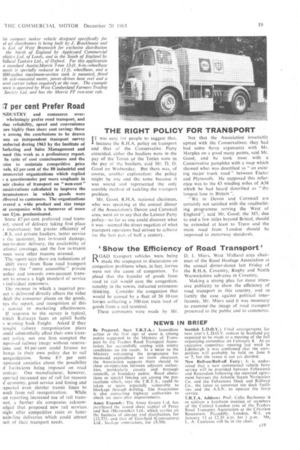7 per cent Prefer Road NDLISTRY and commerce overwhelmingly prefer
Page 21

If you've noticed an error in this article please click here to report it so we can fix it.
road transport, and due reliability, speed and convenience ore highly than sheer cost saving: these +e among the conclusions to be drawn 'om an independent transport survey Inducted during 1963 by the Institute of larketing and Sales Management and sued this week as a preliminary report. In spite of cost consciousness and the :sire to maintain competitive price vels. 62 per cent of the 80 industrial and nnmercial organizations which replied a questionnaire put more emphasis in seir choice of transport on " non-cost" onsiderations calculated to improve the ircnmstances in which goods were alivered to customers. The organizations wered a wide product and size range ut companies with a turnover of more tan £1m. predominated.
Some 87 per cent preferred road transort, speed of delivery taking first place 1 importance; but greater efficiency of .R.S. and private hauliers, better service ) the customer, less in-transit damage, oar-to-door delivery, the availability of ational coverage, and the few in-transit )sses were other reasons stressed.
The report says there are indications of shift away from State road transport )wards the " more accessible" private aulier and towards own-account trans-art to ensure a high standard of service ) individual customers.
The manner in which a required prouct is delivered directly affects the value rhich the consumer places on the goods, ays the report, and recognition of this central to marketing effectiveness. If response to the survey is typical, tritish Railways faces an uphill battle s winning back freight. Asked if they ought railway reorganization plans /mild substantially affect their own transart policy, not one firm accepted the mproved railway image without reservaions and 84 per cent could foresee no bailee in their own policy due to rail eorganization. Some 8.5 per cent :xpressed anxieties about the possibility ,f limitations being imposed on road taulagc•.. One manufacturer, however, eporied increased use of rail for reasons if economy, good service and timing and :xpected even shorter transit times to
esult from rail reorganization. While tot reporting increased use of rail transport, a further six companies acknowedged that proposed new rail services night offer competitive rates or faster nain-line deliveries -which could attract )art of their transport needs. iT was easy for people to suggest that, because the RM.& policy on transport and that of the Conservative Party coincided, either the hauliers were in the pay of the Tories or the Tories were in the pay of the hauliers, said Mr. D. 0. Good on Wednesday. But there was, of course, another explanation: the policy might be one and the same because it was sound and represented the only sensible method of tackling the transport problem.
Mr. Good, R.H.A, national chairman, who was speaking at the annual dinner of the Association's Devon and Cornwall area, went on to say that the Labour Party policy—so far as one could discover what it was—seemed the direct negation of what transport operators had striven to achieve for the best part of half a century. Not that the Association invariably agreed with the Conservatives; they had had some fierce arguments with Mr. Marples on a good many points, said Mr. Good, and he took issue with a Conservative pamphlet with a map which showed what was described as " an existing major trunk road" between Exeter and Plymouth. He supposed this reference was to the 43 winding miles of A38 which he had heard described as "the longest lane in Britain ".
"We in Devon and Cornwall are certainly not satisfied with the roadbuilding programme serving the West of England", said Mr. Good; the M5, due to end a few miles beyond Bristol, should be extended at least to Truro and the main road from I.ondon should be improved to motorway standards.




























































































